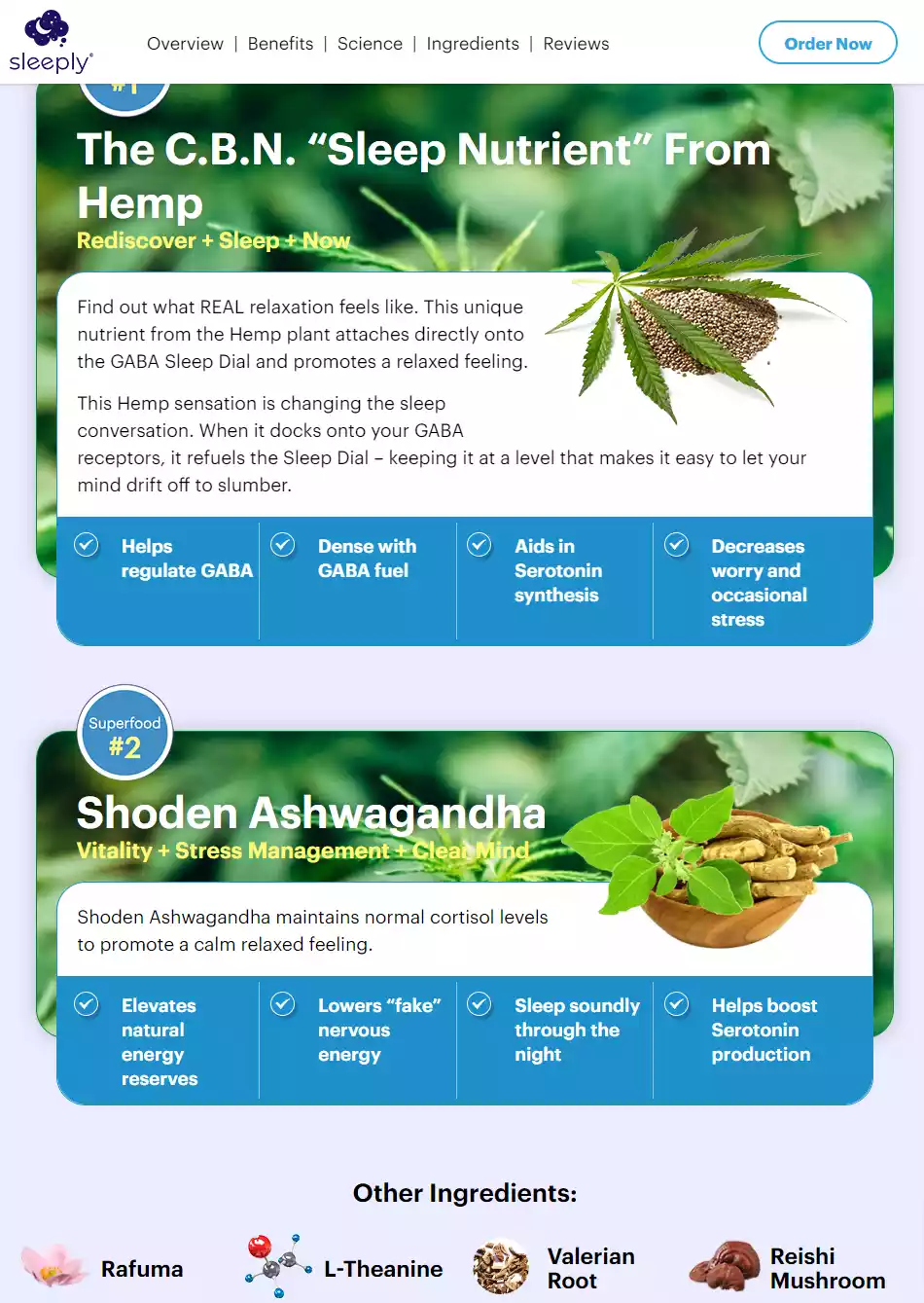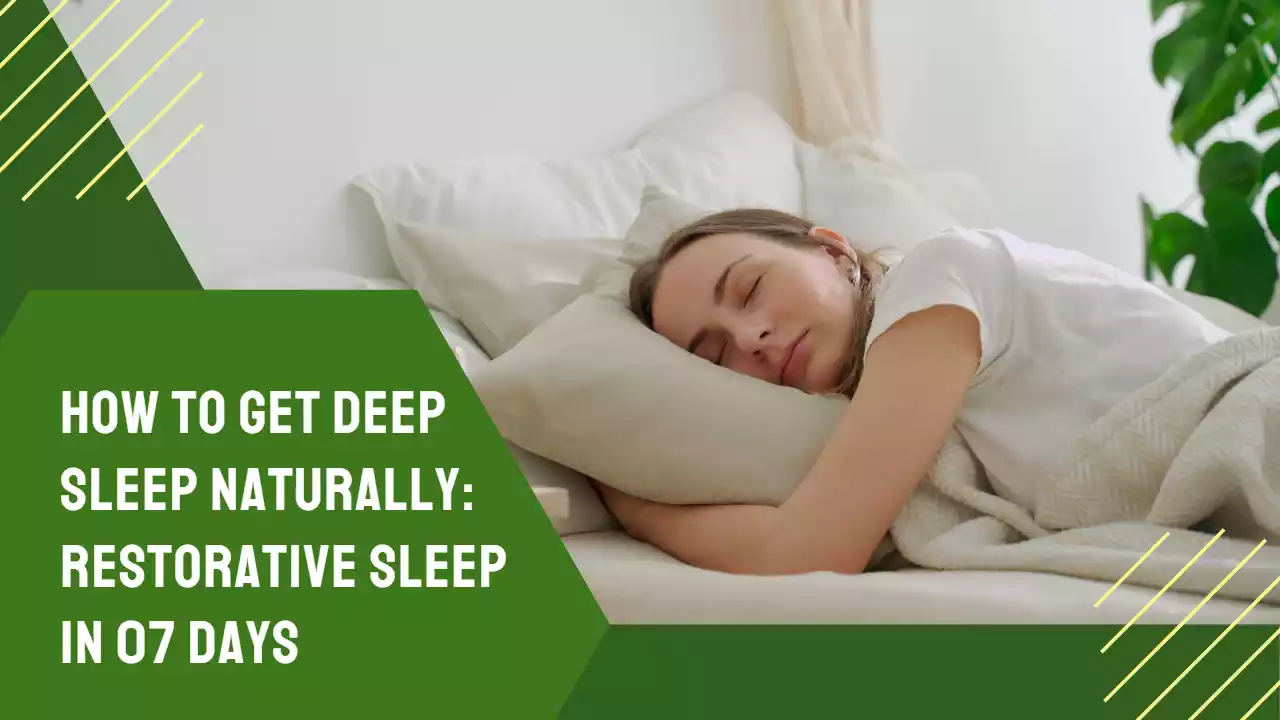Are you struggling to get a good night’s sleep? Do you find yourself tossing and turning, unable to reach the deep sleep your body craves? If so, you’re not alone. Many people experience difficulties when it comes to achieving deep, restorative sleep.
Sleep plays a vital role in our overall health and well-being. It allows our bodies and minds to recharge, repair, and rejuvenate. While we may sleep for an adequate number of hours, it’s the quality of sleep that truly matters. Deep sleep, also known as slow-wave sleep, is the stage of sleep where our bodies experience the most restorative benefits.
In this article, we will explore the importance of deep sleep, factors that can affect its quality, and effective strategies for getting deep sleep naturally.
How to Get Deep Sleep Naturally
A. What is Deep Sleep?
Deep sleep is a phase of sleep characterized by slow brain waves, relaxed muscles, and minimal eye movement. It is the stage in which our bodies repair tissue, strengthen the immune system, and consolidate memories. Deep sleep is essential for optimal cognitive function, physical recovery, and emotional well-being.
B. Benefits of Deep Sleep
Deep sleep offers a wide range of benefits that contribute to our overall health. It helps regulate hormone production, supports cardiovascular health, boosts the immune system, and enhances mental clarity. Additionally, deep sleep plays a crucial role in managing stress and improving mood.
C. Factors Affecting Deep Sleep
Several factors can impact the quality and duration of our deep sleep. By addressing these factors, we can improve our chances of achieving a more restful and rejuvenating sleep experience.
I. Stress and anxiety
Stress and anxiety are common culprits when it comes to disrupted sleep. High levels of stress can make it difficult for the mind and body to relax, leading to shallow sleep and frequent awakenings. Finding effective stress management techniques, such as practicing mindfulness or engaging in relaxing activities, can help promote deep sleep.
II. Sleep environment
Creating a sleep-friendly environment is crucial for enhancing deep sleep. Ensure your bedroom is dark, quiet, and cool. Use blackout curtains, earplugs, or white noise machines to eliminate distractions and create a soothing atmosphere conducive to deep sleep.
III. Lifestyle choices
Certain lifestyle choices can negatively impact sleep quality. Avoid consuming caffeine, nicotine, or alcohol close to bedtime, as they can interfere with the natural sleep cycle. Establish a consistent sleep schedule, even on weekends, to regulate your body’s internal clock and promote deep sleep.
IV. Diet and exercise
The foods we eat and the amount of physical activity we engage in can influence our sleep patterns. A balanced diet rich in sleep-promoting nutrients, such as magnesium and tryptophan, can facilitate deep sleep. Similarly, regular exercise promotes better sleep quality, but it’s important to time your workouts appropriately, allowing for a few hours of wind-down time before bed.
D. Tips for Getting Deep Sleep Naturally
Fortunately, there are several strategies you can incorporate into your routine to improve the quality of your sleep and increase the likelihood of experiencing deep sleep naturally.
I. Establish a bedtime routine
Creating a consistent bedtime routine helps signal your body that it’s time to wind down and prepare for sleep. Engage in relaxing activities such as reading a book, taking a warm bath, or practicing gentle stretches. Avoid stimulating activities and electronic devices that emit blue light, as they can interfere with melatonin production.
II. Create a sleep-friendly environment
As mentioned earlier, your sleep environment plays a crucial role in promoting deep sleep. Invest in a comfortable mattress and pillows that provide proper support. Keep your bedroom cool, dark, and quiet. Consider using a white noise machine or a fan to mask disruptive sounds and create a soothing ambiance.
III. Manage stress and anxiety
Stress and anxiety can significantly impact the quality of our sleep. Incorporate stress-reducing practices into your daily routine, such as meditation, deep breathing exercises, or journaling. These techniques help calm the mind and relax the body, preparing you for a more restful sleep.
IV. Adopt healthy lifestyle habits
Certain lifestyle choices can hinder deep sleep. Avoid consuming heavy meals or spicy foods close to bedtime, as they can cause indigestion or acid reflux. Limit your intake of fluids before bed to minimize nighttime bathroom trips. Maintain a regular exercise routine, but try to avoid intense workouts close to bedtime, as they can increase alertness.
V. Incorporate relaxation techniques
Relaxation techniques can help you unwind and prepare your body for deep sleep. Try practicing progressive muscle relaxation, where you systematically tense and relax each muscle group. Deep breathing exercises, guided imagery, and body scan meditations are also effective in promoting relaxation and better sleep quality.
E. Natural Remedies for Deep Sleep
In addition to the tips mentioned above, there are various natural remedies you can explore to improve the depth and quality of your sleep.
I. Herbal teas and supplements
Certain herbs, such as chamomile, valerian root, and lavender, have calming properties that can promote deep sleep. Enjoy a cup of herbal tea infused with these ingredients before bed, or consider taking herbal supplements specifically formulated to enhance sleep quality.
II. Aromatherapy
Essential oils, when used in aromatherapy, can create a calming atmosphere that supports deep sleep. Lavender, bergamot, and chamomile essential oils are known for their relaxing properties. Use a diffuser or add a few drops of essential oil to a warm bath before bedtime to enjoy their soothing effects.
III. Meditation and mindfulness
Practicing meditation and mindfulness exercises before bed can help calm racing thoughts and promote deep relaxation. Guided meditation apps or podcasts can assist you in entering a state of calm and tranquility, preparing you for a deep sleep experience.
IV. White noise and soothing sounds
Many people find it easier to fall asleep and stay asleep when they’re surrounded by soothing sounds. White noise machines, nature sound recordings, or calming music can drown out disruptive noises and create a peaceful environment that encourages deep sleep.
V. Bedtime yoga and stretching
Gentle yoga poses and stretching exercises can help release tension in the body and relax the mind. Engaging in a short yoga or stretching routine before bed can promote deep sleep by easing physical discomfort and calming the nervous system.
F. The Role of Nutrition in Deep Sleep
The foods we consume can impact our sleep quality. Incorporating certain nutrients into our diet can support deep, restorative sleep while avoiding certain foods and beverages can prevent sleep disruptions.
I. Foods that promote deep sleep
Certain foods contain sleep-promoting compounds that can enhance the quality of your sleep. These include foods rich in tryptophan, such as turkey, nuts, seeds, and dairy products. Additionally, foods high in magnesium, such as leafy greens, almonds, and legumes, can help relax the muscles and promote deep sleep.
II. Foods to avoid before bedtime
Some foods and beverages can interfere with your sleep patterns and make it difficult to achieve deep sleep. Avoid consuming caffeine in the afternoon and evening, as it is a stimulant that can disrupt your sleep. Spicy and fatty foods may cause indigestion or heartburn, leading to sleep disturbances. Alcohol, although it may initially make you drowsy, can disrupt the natural sleep cycle and prevent deep sleep.
III. The importance of hydration
Staying hydrated throughout the day is essential for overall health and can positively affect your sleep quality. Dehydration can lead to discomfort and restless sleep. Aim to drink enough water during the day, and if needed, have a small glass of water before bed to ensure proper hydration.
G. The Impact of Exercise on Deep Sleep
Regular exercise has numerous health benefits, including improved sleep quality. Engaging in physical activity can enhance the amount and quality of deep sleep you experience.
I. Exercise and its Effect on sleep quality
Physical activity has been shown to decrease the time it takes to fall asleep and increase the overall duration of sleep. It helps regulate circadian rhythms, improves sleep efficiency, and reduces symptoms of insomnia. Regular exercise can also alleviate stress and anxiety, which are common barriers to deep sleep.
II. Best exercises for promoting deep sleep
Various forms of exercise can contribute to better sleep quality, but some are particularly effective in promoting deep sleep. Aerobic exercises, such as running, cycling, or swimming, help increase the time spent in deep sleep. Resistance training, yoga, and tai chi can also improve sleep quality and promote relaxation.
III. Timing of exercise for optimal results
While exercise has sleep-enhancing benefits, the timing of your workouts can affect your ability to achieve deep sleep. It’s best to finish your exercise session at least a few hours before bedtime. This allows your body temperature to cool down, and your energy levels to return to baseline, ensuring a more restful sleep.
H. Creating a Sleep-Friendly Environment
The environment in which you sleep can greatly impact your ability to achieve deep sleep. By optimizing your sleep environment, you can create the ideal conditions for a restful night’s sleep.
I. Dark, cool, and quiet room
Ensure your bedroom is as dark as possible to promote the secretion of melatonin, a hormone that regulates sleep-wake cycles. Consider using blackout curtains or an eye mask to block out any sources of light that may disrupt your sleep. Additionally, maintaining a cool room temperature, ideally between 60 and 67 degrees Fahrenheit (15 to 19 degrees Celsius), can facilitate deep sleep. Use a fan or air conditioner if necessary.
II. Comfortable mattress and bedding
Investing in a high-quality mattress and comfortable bedding is crucial for achieving deep sleep. Your mattress should provide adequate support for your body, alleviating pressure points and promoting spinal alignment. Choose pillows and bedding materials that suit your preferences and contribute to a cozy and comfortable sleep environment.
III. Proper lighting and technology usage
Exposure to bright lights, especially from electronic devices, can interfere with your body’s natural sleep-wake cycle. Minimize the use of screens, such as smartphones, tablets, and laptops, before bedtime. If needed, use apps or features that reduce blue light emission. Consider using dimmer switches or soft lighting in your bedroom to create a relaxing atmosphere conducive to deep sleep.
I. The Power of Relaxation Techniques
In addition to creating a sleep-friendly environment, incorporating relaxation techniques into your nighttime routine can help calm the mind and promote deep sleep.
I. Progressive muscle relaxation
Progressive muscle relaxation is a technique that involves tensing and then relaxing specific muscle groups to release tension and promote relaxation. Starting from your toes and moving up to your head, systematically contract and relax each muscle group, focusing on the sensations of tension and release. This practice can help induce a state of deep relaxation, preparing you for a restful sleep.
II. Breathing exercises
Deep breathing exercises, such as diaphragmatic breathing or the 4-7-8 technique, can activate the body’s relaxation response and promote deep sleep. These exercises involve inhaling deeply through your nose, holding your breath for a few seconds, and exhaling slowly through your mouth. Practicing these techniques before bed can help calm your nervous system and prepare your body for sleep.
III. Guided imagery and visualization
Guided imagery and visualization techniques involve creating a mental image or scenario that promotes relaxation and deep sleep. Close your eyes and imagine yourself in a peaceful, serene location, such as a beach or a forest. Focus on the sensory details and allow yourself to fully immerse in the imagery, letting go of any tension or worries.
IV. Body scan meditation
Body scan meditation involves systematically scanning your body from head to toe, bringing awareness to each body part, and observing any sensations or areas of tension. As you scan each body part, consciously relax the muscles and release any tension you may be holding. Body scan meditation can help promote deep relaxation and prepare your body for deep sleep.
Blood Sugar | Diabetes: Understanding, Treatment, and Prevention In 2023
How to Fall into a Deep Sleep Fast or How to Improve Deep Sleep Quality
Achieving a deep and restful sleep is essential for overall health and well-being. If you’re looking to fall into a deep sleep quickly, try incorporating the following strategies into your bedtime routine:

I. Establish a Consistent Sleep Schedule
Maintaining a regular sleep schedule helps regulate your body’s internal clock, making it easier to fall asleep quickly and deeply. Aim to go to bed and wake up at the same time every day, even on weekends.
II. Create a Relaxing Bedtime Routine
Engage in activities that promote relaxation and signal to your body that it’s time to wind down. This could include taking a warm bath, practicing deep breathing or meditation, reading a book, or listening to calming music.
III. Optimize Your Sleep Environment
Ensure that your sleep environment is conducive to deep sleep. Keep your bedroom cool, dark, and quiet. Use comfortable bedding and invest in a supportive mattress and pillow that suit your preferences.
IV. Limit Exposure to Screens Before Bed
The blue light emitted by electronic devices like smartphones, tablets, and computers can interfere with your sleep. Limit screen time at least an hour before bed or use blue light filters or glasses to reduce its impact.
V. Avoid Stimulants and Heavy Meals
Avoid consuming stimulants such as caffeine and nicotine in the evening, as they can interfere with your ability to fall asleep quickly. Additionally, refrain from consuming heavy meals close to bedtime, as they can cause discomfort and disrupt sleep.
VI. Create a Sleep-Friendly Atmosphere
Make your bedroom a sleep sanctuary by keeping it clean, organized, and free from distractions. Use blackout curtains or an eye mask to block out light and consider using earplugs or white noise machines to drown out any disruptive noises.
VII. Practice Relaxation Techniques
Engage in relaxation techniques before bed to calm your mind and prepare your body for sleep. Deep breathing exercises, progressive muscle relaxation, or guided imagery can help induce a state of relaxation and facilitate falling into a deep sleep.
VIII. Avoid Clock-Watching
Constantly checking the clock can create anxiety and make it more difficult to fall asleep. If you find yourself struggling to fall asleep, try turning your clock away from your line of sight or using a sleep mask to avoid focusing on the time.
IX. Try Natural Sleep Aids
Consider using natural sleep aids such as lavender essential oil, chamomile tea, or herbal supplements like melatonin or valerian root. These can help promote relaxation and enhance your ability to fall into a deep sleep quickly.
X. Manage Stress and Anxiety
High levels of stress and anxiety can interfere with sleep. Practice stress management techniques such as journaling, practicing gratitude, or engaging in activities that help you relax and unwind. Consider talking to a therapist if anxiety is consistently affecting your sleep.
XI. Regular Exercise
Engaging in regular physical activity can contribute to better sleep quality. Aim for at least 30 minutes of moderate exercise most days of the week. However, avoid vigorous exercise close to bedtime, as it may energize your body and make it harder to fall asleep.
XII. Avoid Napping Too Long or Late in the Day
If you have trouble sleeping at night, avoid long or late afternoon naps. If you do need to nap, limit it to a short power nap of about 20 minutes earlier in the day.
XIII. Limit Alcohol and Fluid Intake
While alcohol may initially make you feel drowsy, it can disrupt your sleep patterns and lead to poorer sleep quality. Additionally, reduce fluid intake close to bedtime to minimize the need for frequent bathroom trips during the night.
By implementing these strategies, you can create an environment and routine that promotes quick and deep sleep. Remember that consistent sleep habits and a healthy lifestyle are key factors in achieving quality sleep.
What is the 10 3 2 1 0 rule for sleep?
The 10-3-2-1-0 rule is a simple guideline that can help you establish a healthy bedtime routine and optimize your sleep. Each number in the rule represents a specific action or recommendation to follow before bed. Let’s break down the components of the 10-3-2-1-0 rule:
10 Hours before Bed: No Caffeine
Avoid consuming caffeine-containing beverages or foods, such as coffee, tea, energy drinks, or chocolate, at least 10 hours before your planned bedtime. Caffeine is a stimulant that can interfere with your ability to fall asleep and stay asleep.
3 Hours before Bed: No Large Meals or Alcohol
Refrain from consuming heavy or large meals within three hours of bedtime. Digesting a substantial meal close to bedtime can cause discomfort and make it harder to sleep. Additionally, limit alcohol consumption, as it can disrupt your sleep patterns and lead to poorer sleep quality.
2 Hours before Bed: No More Work
Stop engaging in work-related activities at least two hours before bed. This includes tasks such as answering work emails, checking work-related messages, or doing any mentally demanding work. The goal is to give your mind time to unwind and transition into a more relaxed state before sleep.
1 Hour before Bed: No Screens, Engage in Relaxing Activities
Power down electronic devices, such as smartphones, tablets, computers, or TVs, at least one hour before bed. The blue light emitted by these screens can interfere with your body’s natural sleep-wake cycle. Instead, engage in relaxing activities like reading a book, taking a warm bath, practicing relaxation techniques, or enjoying a calming hobby.
0: Create a Sleep-Conducive Environment
When it’s time to sleep, make sure your bedroom environment is optimized for restful sleep. Set the thermostat to a cool temperature, make the room as dark as possible, use comfortable bedding and pillows, and minimize noise or disturbances. Creating a sleep-conducive environment can help you fall asleep faster and enjoy better sleep quality.
By following the 10-3-2-1-0 rule, you can establish a consistent bedtime routine that promotes relaxation, reduces stimulation, and prepares your mind and body for a restful night’s sleep. Remember, it’s important to adapt these recommendations to suit your individual needs and preferences.
What is the 80-20 rule of sleep?
The 80-20 rule, also known as the Pareto Principle, can be applied to various aspects of life, including sleep. When it comes to sleep, the 80-20 rule suggests that focusing on a few key factors can have a significant impact on the overall quality of your sleep. Let’s explore how the 80-20 rule can be applied to sleep:
80%: Establish Healthy Sleep Habits
The majority of your effort should be dedicated to establishing healthy sleep habits. This includes factors such as:
I. Consistent Schedule:
Maintain a regular sleep schedule by going to bed and waking up at the same time every day, even on weekends.
II. Sleep Environment:
Create a sleep-friendly environment that is cool, dark, quiet, and comfortable.
III. Relaxation Routine:
Develop a relaxing bedtime routine that helps signal to your body that it’s time to unwind and prepare for sleep.
IV. Stress Management:
Manage stress and anxiety through techniques like meditation, deep breathing exercises, or journaling to promote better sleep.
V. Healthy Lifestyle:
Adopt a healthy lifestyle that includes regular exercise, a balanced diet, and avoiding stimulants like caffeine and nicotine close to bedtime.
By focusing on these aspects, you can establish a strong foundation for healthy sleep habits and optimize your chances of experiencing quality sleep.
20%: Address Specific Sleep Concerns
The remaining 20% of your focus can be dedicated to addressing any specific sleep concerns or issues you may have. This could include factors such as:
I. Sleep Disorders:
If you suspect you have a sleep disorder, such as sleep apnea or insomnia, consult with a healthcare professional for a proper diagnosis and treatment plan.
II. Medical Conditions:
Certain medical conditions or medications can impact your sleep. Work with your healthcare provider to manage these factors and find strategies to improve your sleep quality.
III. Lifestyle Adjustments:
If certain lifestyle factors are affecting your sleep, such as excessive screen time, irregular work hours, or excessive stress, make adjustments to mitigate their impact on your sleep.
IV. Sleep Aids or Supplements:
In some cases, sleep aids or supplements may be appropriate. Consult with a healthcare professional for guidance on using these interventions safely and effectively.
By addressing specific sleep concerns and tailoring your approach, you can further optimize your sleep quality and address any underlying issues that may be affecting your rest.
Remember, the 80-20 rule provides a general guideline for prioritizing and optimizing your sleep. It’s important to listen to your body, understand your individual needs, and make adjustments accordingly.
What is the 789 sleep method?
The 7-8-9 sleep method is a relaxation technique that can help you fall asleep more easily. It involves a series of steps designed to calm your mind and body before bed. Let’s explore the 7-8-9 sleep method:
7 Seconds: Breathe in
Start by taking a deep breath through your nose for a count of seven seconds. Fill your lungs with air and focus on the sensation of your breath entering your body. This deep breathing technique helps activate your body’s relaxation response.
8 Seconds: Hold your breath
After you’ve taken a deep breath, hold your breath for a count of eight seconds. During this brief pause, try to maintain a sense of stillness and allow your body to relax further.
9 Seconds: Breath out
Exhale slowly and fully through your mouth for a count of nine seconds. As you release your breath, imagine letting go of any tension or stress in your body. Feel the relaxation spreading throughout your muscles and your mind becoming calmer.
Repeat as needed
Continue this breathing pattern, taking a deep breath in for seven seconds, holding for eight seconds, and exhaling for nine seconds. Repeat this cycle several times, focusing on the rhythmic and soothing pattern of your breath. This repetition helps your body and mind enter a state of relaxation, making it easier to fall asleep.
The 7-8-9 sleep method is a simple yet effective technique to calm your nervous system and prepare your body for sleep. It can be used as part of a bedtime routine or whenever you’re feeling restless and having trouble falling asleep.
In addition to this technique, remember to create a sleep-friendly environment, practice good sleep hygiene, and establish a consistent sleep schedule for optimal sleep quality.
Natural Home Remedies for Good Sleep
Having a good night’s sleep is essential for overall well-being and productivity. If you’re struggling with sleep issues and want to improve your sleep quality naturally, try these effective home remedies:

I. Chamomile Tea
Chamomile tea is known for its soothing properties and is often used as a natural remedy for promoting sleep. The herb contains compounds that can help relax the body and mind, reducing anxiety and promoting a sense of calmness before bedtime. Enjoy a warm cup of chamomile tea about an hour before you plan to sleep to experience its sleep-enhancing effects.
II. Lavender Essential Oil
Lavender has long been used for its relaxing and sleep-inducing properties. Add a few drops of lavender essential oil to a diffuser in your bedroom or sprinkle a few drops on your pillow before sleep. The calming scent of lavender can help you unwind, reduce stress, and promote more restful sleep.
III. Warm Milk
A glass of warm milk before bed is a classic home remedy for better sleep. Milk contains tryptophan, an amino acid that promotes the production of serotonin and melatonin, hormones that regulate sleep. The warmth of the milk also has a soothing effect on the body, helping you relax and prepare for a good night’s sleep.
IV. Valerian Root
Valerian root is a herbal remedy often used to treat insomnia and promote deep sleep. It has sedative properties that can help calm the nervous system and induce sleep. You can find valerian root in supplement form or as a tea. Consult with a healthcare professional for the appropriate dosage and usage.
V. Magnesium-Rich Foods
Magnesium is a mineral that plays a crucial role in sleep regulation. Consuming magnesium-rich foods can help relax the muscles and calm the nervous system, leading to better sleep. Include foods such as dark leafy greens, nuts, seeds, legumes, and whole grains in your diet to increase your magnesium intake.
VI. Herbal Sleep Pillow
Create a herbal sleep pillow by filling a small cloth bag with dried herbs known for their calming properties, such as lavender, chamomile, and valerian root. Place the pillow near your head or under your pillow to benefit from the relaxing aromas and promote better sleep.
VII. Passionflower
Passionflower is a herb that has been used for centuries to treat insomnia and anxiety. It has sedative properties and can help induce a state of relaxation, making it easier to fall asleep. Passionflower supplements are available in capsule or tincture form. Follow the recommended dosage instructions on the product label.
VIII. Ashwagandha
Ashwagandha is an adaptogenic herb known for its stress-reducing properties. It helps the body adapt to stress and promotes a sense of calmness. By reducing stress and anxiety, ashwagandha can indirectly improve sleep quality. Take 300 to 500 mg of ashwagandha extract daily.
IX. Ginkgo Biloba
Ginkgo biloba is an herbal supplement known for its cognitive-enhancing properties. It can also have a positive impact on sleep quality by improving blood circulation and reducing anxiety. Take 120 to 240 mg of ginkgo biloba extract per day, preferably in the morning or early afternoon.
Improving your sleep quality doesn’t always require medication or drastic measures. By incorporating these natural home remedies into your routine, you can promote restful and rejuvenating sleep. Experiment with different remedies and techniques to find the ones that work best for you. Remember to prioritize your sleep and create a relaxing bedtime routine that prepares you for a good night’s sleep.
Foods, Fruits, and Drinks to Help You Sleep
If you’re struggling with sleep issues, incorporating certain foods, fruits, and drinks into your diet can promote better sleep quality. These natural options contain sleep-inducing compounds and can help you relax before bedtime. Consider adding the following to your evening routine:

I. Tart Cherry Juice
Tart cherry juice is a natural source of melatonin, the hormone that regulates sleep-wake cycles. Consuming tart cherry juice in the evening can increase melatonin levels in your body, promoting more restful sleep. Aim for about 8 ounces of tart cherry juice a few hours before bedtime.
II. Bananas
Bananas are rich in potassium and magnesium, which help relax muscles and promote sleep. They also contain tryptophan, an amino acid that aids in the production of serotonin and melatonin. Enjoy a ripe banana as an evening snack or add slices to a bowl of yogurt or oatmeal.
III. Almonds
Almonds are a good source of magnesium, which can help relax muscles and promote sleep. They also contain tryptophan and healthy fats that contribute to a feeling of fullness and satisfaction. Enjoy a small handful of almonds as a pre-bedtime snack.
IV. Warm Milk
Warm milk has long been considered a classic sleep-inducing remedy. It contains tryptophan, an amino acid that can help promote the production of serotonin and melatonin, facilitating sleep. Enjoy a warm cup of milk or incorporate it into a soothing bedtime drink.
V. Herbal Tea (Chamomile, Valerian, Lavender)
Herbal teas such as chamomile, valerian, and lavender have calming properties that can help relax the body and mind before sleep. Brew a cup of herbal tea about an hour before bedtime to experience its soothing effects.
VI. Kiwi
Kiwi is a fruit that is rich in antioxidants, vitamin C, and serotonin. Serotonin helps regulate sleep patterns and promotes relaxation. Consuming a kiwi before bed may help improve sleep quality. Enjoy a fresh kiwi or incorporate it into a smoothie.
VII. Whole Grains (Oats, Quinoa)
Whole grains like oats and quinoa are rich in complex carbohydrates. These foods can help increase the production of serotonin, promoting relaxation and better sleep. Enjoy a bowl of oatmeal or a quinoa salad as part of your evening meal.
VIII. Herbal Sleep Infusions
Certain herbs, such as chamomile, valerian root, and lavender, can be steeped in hot water to create soothing sleep infusions. These infusions have calming properties and can help relax the mind and body before bedtime. Follow the instructions on the herbal infusion product for brewing.
IX. Dark Chocolate
Dark chocolate, in moderation, can be a beneficial sleep aid. It contains magnesium and tryptophan, which can help relax the body and promote sleep. Choose dark chocolate with a high cocoa content and enjoy a small piece as an occasional evening treat.
X. Warm Turmeric Milk
Turmeric contains curcumin, a compound known for its anti-inflammatory and antioxidant properties. Combining turmeric with warm milk creates a soothing and comforting bedtime drink. Add a pinch of turmeric and a dash of honey to warm milk and enjoy before sleep.
Incorporating these sleep-promoting foods, fruits, and drinks into your evening routine can contribute to better sleep. Remember to practice overall healthy sleep habits, such as creating a relaxing bedtime routine, maintaining a comfortable sleep environment, and avoiding stimulants close to bedtime.
Supplements to Increase Deep Sleep
If you’re looking to enhance the quality of your deep sleep, certain supplements can support this process. These supplements work by promoting relaxation, reducing anxiety, and improving sleep architecture. Consider incorporating the following supplements into your routine to increase deep sleep:

I. Magnesium
Magnesium is an essential mineral that plays a vital role in sleep regulation. It helps calm the nervous system, relax muscles, and promote a state of tranquility. Supplementing with magnesium can enhance sleep quality, including deep sleep. Aim for a daily dosage of 200 to 400 mg of magnesium citrate or glycinate.
II. GABA (Gamma-Aminobutyric Acid)
GABA is a neurotransmitter that acts as a natural calming agent in the brain. Supplementing with GABA can help reduce anxiety, promote relaxation, and improve sleep quality, including the amount of time spent in deep sleep. Start with a low dosage (around 500 mg) and gradually increase as needed.
III. Melatonin
Melatonin is a hormone naturally produced by the body that regulates sleep-wake cycles. Supplementing with melatonin can be effective in increasing deep sleep duration and quality. Take a low dose (typically 0.5 to 3 mg) about an hour before bedtime to synchronize your internal clock and promote deeper sleep.
IV. L-theanine
L-theanine is an amino acid found in green tea that promotes relaxation and reduces stress. It can increase the production of alpha brain waves, which are associated with a relaxed and focused state. By enhancing relaxation, L-theanine can support deeper and more restful sleep. Take 100 to 200 mg of L-theanine before bedtime.
V. Valerian Root
Valerian root is a herbal supplement known for its calming and sleep-inducing properties. It can increase the production of GABA, helping to promote relaxation and deep sleep. Take about 500 to 600 mg of valerian root extract one hour before bed for optimal results.
VI. 5-HTP (5-Hydroxytryptophan)
5-HTP is an amino acid that is converted into serotonin in the body. Serotonin is a neurotransmitter that plays a crucial role in sleep regulation. Supplementing with 5-HTP can increase serotonin levels, promoting deep and restorative sleep. Start with a low dose (50 to 100 mg) and gradually increase as needed.
VII. Zinc
Zinc is an essential mineral that is involved in numerous processes in the body, including sleep regulation. It plays a role in the conversion of tryptophan to serotonin, which is important for deep sleep. Supplement with 15 to 30 mg of zinc daily, preferably before bed.
VIII. CBD (Cannabidiol)
CBD is a non-psychoactive compound derived from the hemp plant. It has calming and relaxing effects on the body, which can promote deep sleep. CBD interacts with the endocannabinoid system, which plays a role in sleep regulation. Follow the recommended dosage instructions on CBD products.
IX. Glycine
Glycine is an amino acid that acts as an inhibitory neurotransmitter in the brain, promoting relaxation and deep sleep. Supplementing with glycine can improve sleep quality and reduce the time it takes to fall asleep. Take 3 grams of glycine before bedtime.
X. Hops
Hops, the flowers of the hop plant, are commonly used in the production of beer but are also available as a herbal supplement. Hops have sedative properties and can help induce deep sleep. Take about 500 to 1,000 mg of hops extract before bed.
Before incorporating any supplements into your routine, it’s important to consult with a healthcare professional, especially if you have underlying health conditions or are taking medications. They can provide personalized guidance and ensure that the supplements are safe for you.
Remember that supplements should be used in conjunction with other healthy sleep habits, such as maintaining a consistent sleep schedule, creating a relaxing bedtime routine, and optimizing your sleep environment.
Recommended Supplements: Sleeply
If you are having a hard time getting deep restorative sleep? If so, then Sleeply may be the answer. This unique nutritional supplement provides an effective, natural solution to help you get the restful night’s sleep that your body needs. A special combination of special herbs and vitamins inside Sleeply promotes sound sleep patterns and reduces fatigue during the day. Its nutrients work to produce calming alpha brain waves – perfect for inducing a deeper level of restorative slumber.
Sleeply is now one of the best sleep aids accessible. It encourages restful sleep and enhances mood. Furthermore, it reduces tension, anxiety, and exhaustion. Even if you’ve experienced sleep-related issues for years, using this method for a few weeks will help you reset your sleep cycle. Sleeply’s components are supported by decades of clinical research, including placebo-controlled, double-blind studies. They were chosen and combined to enhance their synergistic effects and develop a sleep-inducing mixture. It is produced in an FDA-approved facility in the United States.
Sleeply’s active components are helpful for everyone who struggles to get a good night’s rest. All of the substances in this sleep aid are provided at levels established in clinical trials to improve sleep quality.
Here are the essential components of Sleeply and their benefits:

Conclusion
Achieving deep sleep naturally is crucial for overall health and well-being. By understanding the importance of deep sleep, addressing factors that affect its quality, and implementing effective strategies, you can improve the depth and restorative power of your sleep. From establishing a bedtime routine to creating a sleep-friendly environment, and incorporating relaxation techniques, there are numerous steps you can take to enhance your sleep and experience the benefits of deep sleep. Prioritize your sleep and explore various natural remedies and treatments to find the combination that works best for you.
FAQs
Q. Can certain medications affect deep sleep?
A. Yes, some medications, such as certain antidepressants, beta-blockers, and stimulants, can interfere with deep sleep. If you’re concerned about the impact of your medications on your sleep, consult with your healthcare provider for personalized advice.
Q. How long does deep sleep typically last?
A. Deep sleep cycles usually last for around 90-120 minutes, and we experience several cycles throughout the night. The duration of deep sleep can vary from person to person and may be influenced by age, overall sleep quality, and individual sleep patterns.
Q. Is it normal to dream during deep sleep?
A. Dreams are more commonly associated with REM (rapid eye movement) sleep, which occurs in the later stages of the sleep cycle. Deep sleep is characterized by slow brain waves and a lack of vivid dreaming. However, some individuals may experience dreams during deep sleep as well.
Q. Are there any alternative therapies that can promote deep sleep?
A. Yes, several alternative therapies, such as acupuncture, acupressure, and herbal medicine, have been used to promote deep sleep. While scientific evidence may be limited, some individuals find these therapies helpful in improving sleep quality. Consult with a qualified practitioner for personalized recommendations.
Q. How long does it take to notice improvements in sleep quality?
A. The time it takes to notice improvements in sleep quality can vary from person to person. Some individuals may experience positive changes within a few days of implementing sleep-enhancing strategies, while others may require a few weeks. Consistency and patience are key when making lifestyle changes to improve sleep.
Q. Are these remedies suitable for everyone?
A. While these remedies are generally safe, it’s essential to consider individual differences and potential allergies. Consult with a healthcare professional if you have any specific health concerns or if you’re taking medications.
Q. Can I combine multiple remedies?
A. Yes, you can combine different remedies to enhance their effects. However, it’s advisable to start with one remedy at a time to assess its impact on your sleep quality.
Q. Are there any lifestyle changes I should consider for better sleep?
A. Along with these remedies, maintaining a healthy lifestyle is important for good sleep. Regular exercise, a balanced diet, stress management, and creating a bedtime routine can significantly contribute to better sleep.
Q. Where can I find more information about sleep disorders?
A. If you suspect you have a sleep disorder or if your sleep issues persist, it’s recommended to consult with a healthcare professional or a sleep specialist for proper evaluation and guidance.


